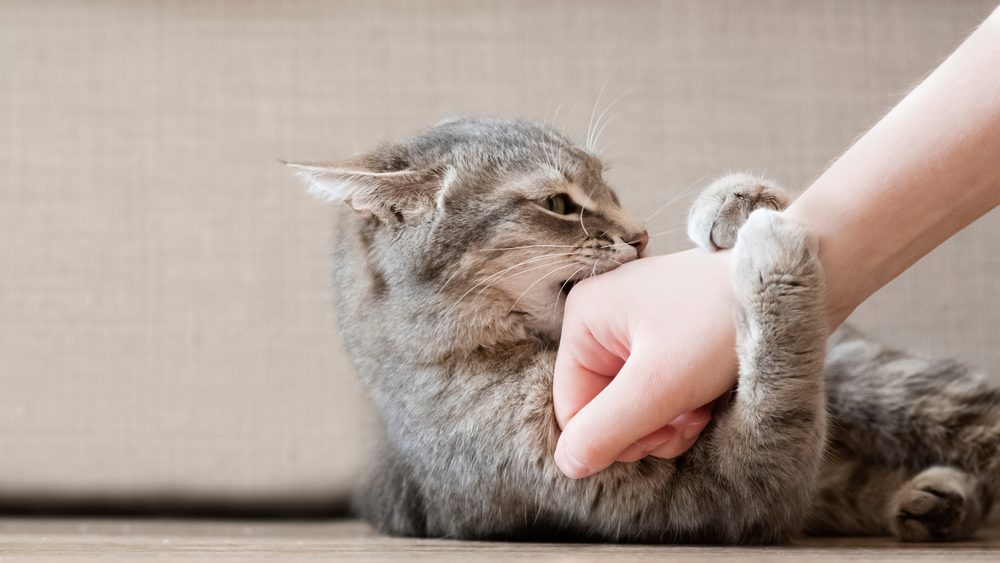We’ve shared our homes with cats for over 10,000 years, but our feisty feline companions still hold an air of mystery about them. From their hilarious antics to their regal appearance, there’s something about cats that makes them the most popular house pet in the United States. Unfortunately, bringing home that precious tabby you saw might not be the best idea for everyone.
In some cases – as much as it pains us to be the bearer of bad news – owning a cat could be the worst thing you can do for your health. We’ll give you the lowdown on why cats are bad for your health. (We’re sorry. It hurts us, too.)

Can cats affect your health?
According to Dr. Greg Fricchione, a psychiatrist and the director of the Benson-Henry Institute for Mind Body Medicine (a Harvard-backed facility), “We do best medically and emotionally when we feel securely attached to another because we’re mammals and that’s the way we’ve evolved.” The bond you share with your cat can help you feel more emotionally satisfied, and it’s been scientifically proven to reduce your risk of suffering from a stroke or heart attack. Sadly, that’s not always the case. For some people, the risk of owning a cat far outweighs any potential health benefits.
Who shouldn’t own a cat?
Some experts say that owning a cat can do more harm than good. If you fall under one of the following categories, you might want to think twice about adopting that adorable kitten you saw at the shelter. At the very least, we recommend speaking to your doctor about whether or not it’s safe for you to have a cat. Conditions that make cat ownership dangerous include:
Pregnant women
Cats can spread an infectious disease called toxoplasmosis, which ordinarily doesn’t cause symptoms in most animals – or even humans. Toxoplasmosis is spread in your cat’s feces after the cat ingests an infected animal or anything contaminated with feces from an infected animal. While toxoplasmosis won’t harm your cat, the simple act of cleaning a litter box can put a woman’s pregnancy in grave danger. With an estimated 15-40% of cats being exposed to toxoplasmosis at some point in their lives, you might want to hold off on adopting a cat if you are or are planning to become pregnant.

Those with compromised immune systems
If you’re immunocompromised due to a health condition or as a result of medication, owning a cat can be dangerous. Sharing your home with a cat puts you at increased risk of the following:
- Diarrheal diseases, such as Giardia, Salmonella, Campylobacter, and Cryptosporidiumparvum: Salmonellosis is especially dangerous if you’re immunocompromised. With a high morbidity rate, this disease may cause sepsis, which is potentially life-threatening to immunocompromised patients.
- Tuberculosis: While incredibly rare – there have only been six documented cases of a patient contracting the tuberculosis-causing M. bovis bacteria from their cats in 150 years – a compromised immune system means your risk of infection is much higher than a healthy individual’s.
- Cat scratch disease (CSD): Commonly referred to as cat scratch fever, cat scratch disease occurs roughly three to 14 days after an individual has been bitten or scratched by an infected cat carrying the Bartonella henselae bacteria. Symptoms include exhaustion, fever, swollen lymph nodes, poor appetite, and headache. In rare cases, CSD can cause sepsis, swelling of the brain, and it can even infect the heart. In severe cases, cat scratch disease can be fatal.
Asthma
Asthma sufferers are painfully familiar with the lightheadedness and shortness of breath brought on by an asthma attack. If you have even a mild cat allergy, exposure to a frisky feline can trigger your asthma. Cats carry a protein called Felis Domesticus 1 (Fel D1 for short) in their urine, saliva, and dander. Exposure to this protein can set off allergy and asthma attacks.

All hope is not lost
By now, you may be disheartened and wondering if you’ll ever be able to adopt a cat, and if you already have one, you might be worried you’ll have to rehome your furry companion. We have some good news – it’s not all gloom and doom. Studies show that children reared in a household with cats are actually less likely to develop asthma and allergies. Unless you have severe allergies or have been advised against adopting one by your doctor, you should be able to share your home with a cat.
- If you’re pregnant, immunocompromised, or allergic, we recommend taking several precautions if you already have cats (or you’re determined to adopt one anyway).
- Always wear gloves when cleaning the litter box or picking up hairballs.
- Bathe your cat frequently to reduce allergens, or consider adopting a hypoallergenic cat. Most importantly, never allow your cat to go outside or feed her raw meat, which could expose her to a multitude of disease-causing bacteria.
If you’re very careful – and you have your doctor’s approval – you can reduce the risks of cat ownership.




